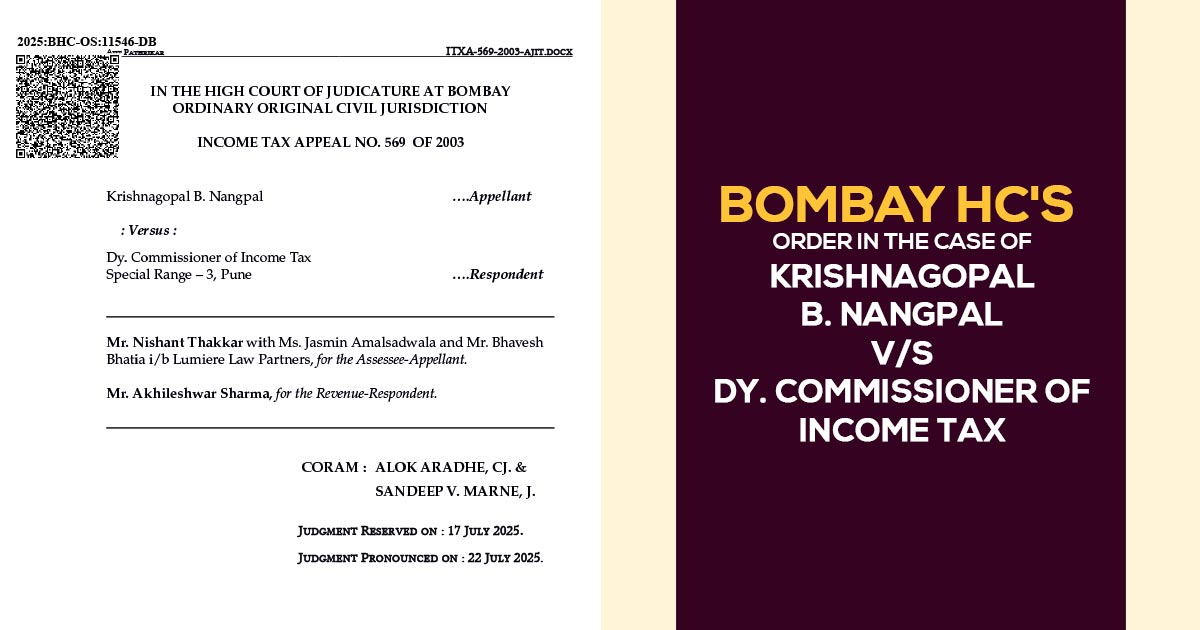
The sale proceeds of one residential house, used for the purchase of multiple residential houses, shall come under the exemption u/s 54(1) of the Income Tax Act, the Bombay High Court ruled.
The bench witnessed that the issue is whether Section 54(1) of the Income Tax Act permits the taxpayer to set off the cost of purchase of more than 1 residential unit against the capital gains made via the sale of a single residential house.
Chief Justice Alok Aradhe and Justice Sandeep V. Marne explained that the phrase “a residential house” in Section 54 (1) of the Income Tax Act does not just refer to one single house. Instead, it can also include multiple residential houses.
Also, the bench said that “The emphasis in the unamended Section 54 (1) of the Act is on the residential nature of the property and the objective was never to restrict the number of residential houses purchased against capital gains. The words ‘a residential house’ were merely descriptive nature of the assets sold/purchased and not restrictive of the number of assets sold or purchased. The position got modified by the Legislature only w.e.f. 01 April 2015.”
As per the taxpayer, the taxpayer is qualified for the exemption against the whole capital gain which was invested for the purchase of seven row houses by him.
According to the taxpayer, the phrase ‘a residential house’ is specified to entitle the nature of the asset purchased/sold, viz., what is sold or purchased cannot be a commercial asset/premises. It is cited from the Finance (No. 2) Act, 2014 amendment that the restriction of exemption of capital gain against ‘one residential house’ is made applicable prospectively, i.e. w.e.f. 01st April 2015.
Read Also: Easy Explanation on TDS for Property Sale by NRI (New Guide)
Revenue claims that the Legislature has intended to provide distinct meanings to the words ‘any’ and ‘a’ in distinct sections of the act and has used the words’ a residential house rather than using the words ‘any residential house’. The word ‘a’ is specified for merely 1 residential house, unlike the use of the word any to convey investments in one or more assets.
As per the bench, the Finance (No.2) Act 2014 amendment makes it clear that post-amendment, the capital gains could be adjusted against the purchase of merely one residential house.
As per the bench, “The word ‘a’ is consciously replaced by the legislature by the word ‘one’ by way of amendment, making the intention clear that after the amendment, it is impermissible to adjust the capital gains arising out of one house towards the purchase of more than one house. If the restriction of adjustment of capital gains against only one house was already there in the unamended Section 54(1), there was no necessity of amendment by specifically using the word ‘one’.
The bench directed to the matter of Tilokchand & Sons v. ITO 2019 (413) ITR 189 (Madras) where it was ruled that “even if the multiple houses are purchased bearing different addresses, the same did not make any difference, so long as the same Assessee has purchased the same out of sale consideration of the sold house.”
Also Read: ITAT Allows CG Exemption on House Construction and Deletes Penalty U/S 271(1)(c)
As per the bench, the provisions of Section 54(1) of the Act are useful. The motive of the benevolent provision has the objective to motivate house purchase activities. It would hence be required to be read literally and reasonably. Thus, even though two interpretations of the provisions of unamended Section 54(1) of the Act may be feasible, the one in favour of the taxpayer shall need to be accepted.
The bench in the above-mentioned view has permitted the appeal.
| Case Title | Krishnagopal B. Nangpal vs Dy. Commissioner of Income Tax Special Range |
| Case No. | W.P.(C) 5757/2025 & CM APPL. 26284/2025 |
| For Petitioner | Mr. Nishant Thakkar with Ms. Jasmin Amalsadwala and Mr. Bhavesh Bhatia i/b Lumiere Law Partners |
| For Respondent | Mr. Akhileshwar Sharma |
| Bombay High Court | Read Order |









